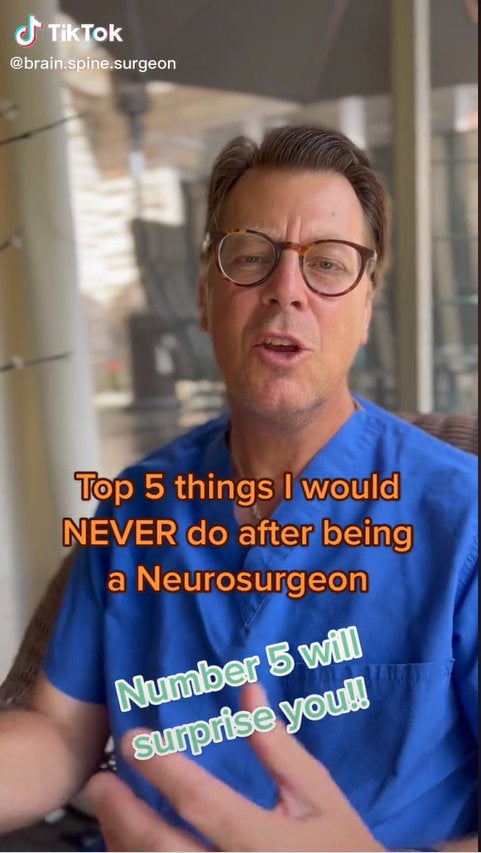Neurosurgeon reveals five things to avoid for a healthy brain
Dr Brian Hoeflinger is no stranger to seeing the gruesome affects of poor health habits
Your support helps us to tell the story
From reproductive rights to climate change to Big Tech, The Independent is on the ground when the story is developing. Whether it's investigating the financials of Elon Musk's pro-Trump PAC or producing our latest documentary, 'The A Word', which shines a light on the American women fighting for reproductive rights, we know how important it is to parse out the facts from the messaging.
At such a critical moment in US history, we need reporters on the ground. Your donation allows us to keep sending journalists to speak to both sides of the story.
The Independent is trusted by Americans across the entire political spectrum. And unlike many other quality news outlets, we choose not to lock Americans out of our reporting and analysis with paywalls. We believe quality journalism should be available to everyone, paid for by those who can afford it.
Your support makes all the difference.A neurosurgeon has revealed the things you should never do if you want to maintain good brain health, including ignoring a sore back and drinking an excessive amouhnt of alcohol.
Dr Brian Hoeflinger, from Ohio, US, has worked as a neurosurgeon for 23 years and now shares his knowledge with thousands on social media.
He is no stranger to seeing the gruesome affects of poor health habits, performing up to seven brain or spine surgeries each day.
In a TikTok video that surpassed one million views, Dr Hoeflinger revealed five things he would never do as a professional neurosurgeon.
The list included never diving into water without checking its depth, ignoring a headache, and drinking.
Brian added: “Probably one of the most common things I see with brain injuries and spine injuries is with people who have been excessively drinking
“They get into a car accident or they fall down the stairs or they even end up drowning.”
Ignoring seemingly ordinary aches and pains is also one of Dr Hoeflingers no-go’s.
He said: “You have to listen to your body - I have so many people who have symptoms for months and they just ignore it.
“They have a headache for months and then when they get a scan they realise it’s brain cancer.
“Or they have a back pain for six months and then finally go to the doctor to find our they’ve got brain cancer.”
Dr Hoeflinger started sharing his videos online after they sparked popularity amongst his own patients.

He said: “In my office I provide videos to my own patients about their treatment.
“When they leave they forget 80% of what I tell them, so I started making videos for them at home so they can sit down and watch it with their family.
“My patients used to come in right before surgery and they’d ask, “what are we doing again?”
“My patients love my videos so me and my son Kevin wanted to see what the interest is in the general public.
“Turns out people love it - a lot of people just want advice or make goofy comments, I’ve had a lot of people say I look like a young Bruce Willis.”
Dr Hoeflinger wants to change the perception people have that their neurosurgeons “don’t care about them” and “just want to do surgery”.
He said: “When I was 24 I lost my mum to brain cancer, and my son Brian died in a drink driving accident nine-years-ago when he was 18-years-old and it changed my life.
“I use these personal stories with my patients - I can sit down and tell them that this is what I did with my mum, I understand how you’re feeling because I’ve been through it.
After so many years in the job, Brian has more than a few stories to tell.
He said: “I remember a guy who shot himself with a crossbow into his forehead.
“We couldn’t pull the arrow out so we had to remove the front of his skull to get it out - but he survived.
“Coincidentally my wife, who’s a pathologist, got sent the samples from the surgery too.
“Other stories are really rewarding though, I had a woman who’s husband came home and shot her twice in the spine.
“She came in completely paralysed but we did surgery and she had completely recovered and was back working as a schoolteacher six-months later.”




Join our commenting forum
Join thought-provoking conversations, follow other Independent readers and see their replies
Comments